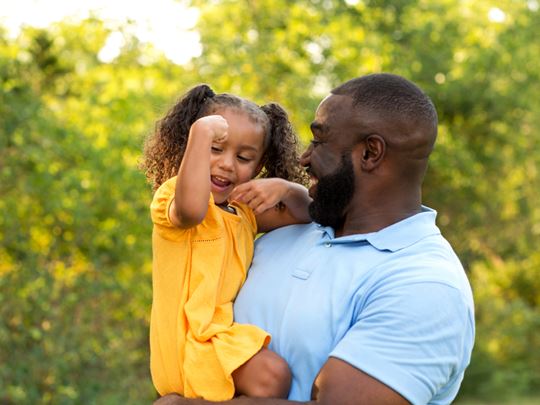
The Significant Role of Foster Dads
Foster dads work hard to help children and young people achieve extraordinary things. The role of ‘foster dad’ is so varied that it means they wear many hats:
- They look after children and young people’s emotional well-being by accepting, respecting and offering a safe place to share their emotions. They connect with them, giving them autonomy and help them feel significant.
- They help children and young people work through their trauma by offering a safe and nurturing environment for them to flourish, alongside employing therapeutic strategies such as PACE. PACE stands for Playfulness, Acceptance, Curiosity and Empathy, a technique that helps foster parents build trust with the child in their care.
- They apply the knowledge they have gained in training, understanding that big emotions and challenging behaviour are strategies children and young people have developed to survive adverse childhood experiences.
- They advocate for children and young peoples’ education, helping them achieve their dreams.
- They teach children and young people new skills, like cooking and riding a bike and life skills, such as problem-solving, communication and empathy.
- They nurture children and young people’s self-esteem, encouraging them to participate in local activities to build friendships and try new things.
- They talk to other foster parents, creating a network of like-minded people to share knowledge, experience and wisdom with to help improve their skills.
- They are positive male role models, modelling healthy behaviour and attitudes.
Foster Dads are Positive Male Role Models
Foster dads have the unique privilege of becoming male role models for the children and young people in their care. Care-experienced children and young people may not have encountered a positive male influence, which could lead to confusion about how to act, treat others and express themselves.
Male Role Models and Toxic Masculinity
YoungMinds describes toxic masculinity as ‘the negative aspects of exaggerated masculine traits’. It can include beliefs, such as men should not show their emotions or that men and women have gendered roles. It can lead to controlling, dominating and violent behaviour and impacts men seeking help in crisis. Toxic masculinity is harmful to children and young people and can be present on social media, at school and in the home. So, having a positive male role model, like a foster dad, who doesn’t display these traits can have a significant impact.
Foster dads challenge toxic masculinity because they nurture children, show empathy, are open communicators, and can resolve conflict before it escalates. Foster dads aren’t perfect; they are only human, but they can show children and young people a healthy version of masculinity.

The Challenges and Rewards of Being a Foster Dad
Foster parenting brings with it a unique set of challenges, from big emotions to challenges with children and young people’s education. Foster dads are on the frontline; they are there through all the ups and downs of life. But what can be more rewarding than helping a child or young person recover from their trauma, overcome adversity and accomplish extraordinary things?
Steve, a foster dad, explains, ‘We have dealt with many varying issues, from lack of routines or boundaries, very few possessions to parental let downs, depression and self-harming…but to watch them come through stronger and their personalities shine brighter, whilst seeing how happy they have become, makes it all worth it.’
Ian, another foster dad, says, “Fostering has fulfilled more than I could have ever expected and wished for.” He recalls his first Father’s Day as a foster dad when the children in his care gave him a Father’s Day card and how “It was an amazing feeling”.
How Fostering People Support Foster Dads
At Fostering People, we understand the daily challenges faced by foster dads. Whether fostering with a partner or as a single foster dad, we are here to guide and support foster parents on their fostering journey.
- We are community-centred, with all our social workers living and working from home inside the communities of the regions we serve. They are close at hand and know the local area well.
- We ensure our foster parents never feel alone, so we are contactable 24/7 via our helpline.
- All our foster parents have access to our network of highly qualified professionals, such as therapists, educational leads and other professionals who specialise in diverse areas of fostering.
- We organise support groups in local community venues, allowing foster parents to meet each other, share experiences and become a collaborative community.
- Each area provides foster parents with a full calendar of events for the whole family.
- We offer ongoing professional development and extensive foster care training to all our foster parents in local community venues and online.
Addressing Father’s Day Sensitively
Father’s Day can be a sensitive topic for children and young people living with foster parents, so it is vital to be mindful when managing Father’s Day with foster children and planning celebrations. Here are our tips to help you address Father’s Day sensitively:
- Communicate – Talk to the child or young person in your care about Father’s Day. Ask them if they would like to celebrate in any particular way or not celebrate at all.
- Listen – verbally and non-verbally to what they are trying to tell you. They may express feelings about Father’s Day openly or communicate in other ways. They may show big emotions about unrelated things as they try to process deeper-rooted feelings about their birth family. They may isolate themselves so they can avoid confronting Father’s Day.
- Understand – big emotions or disinterest in Father’s Day aren’t about you. They may feel loyalty towards their birth dad, and this could make them feel uncomfortable about recognising the day at all.
- Offer your support – on special days such as Father’s Day, the child or young person may need more support. If they are struggling with feelings about the day, you could try and take their mind off it by doing something with them that they enjoy, like watching their favourite TV show or cooking a meal together.
- If you have birth children – Ensure the child or young person doesn’t feel excluded and talk to your birth children to help them understand why this day could be difficult for them.
- Talk to other foster dads – they may have had similar experiences and could help you with strategies to approach the day sensitively.
- If your foster child would like to celebrate, then celebrate! You could go on a day trip or do a foster dad and child activity to help build your connection.
There is no right way to celebrate Father’s Day; by supporting and communicating with the child in your care, you can customise the day to suit your family.
If you are considering becoming a foster parent and want to learn more about fostering, enquire today!